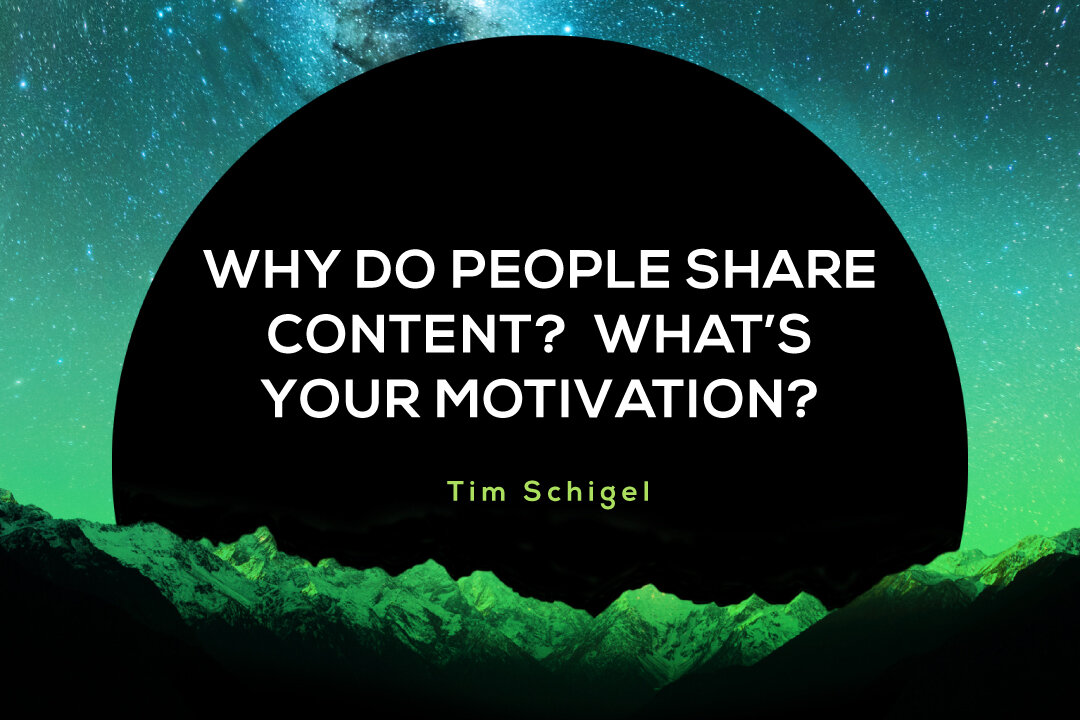With more and more of the world “going digital” in ever-increasing ways, means of communication that used to involve actual in-person interaction is going by the wayside. And now that we are all posting and tweeting versus conversing face-to-face, sharing content has brought a whole new meaning to how one conveys information,.
With this in mind, questioning how one comes across and proactively working on ways to ever-improve that message (without real conversation) is vital. To accomplish this, you must break down your sharing of content to its bare bones and understand the why of what you are saying. You must discover what is motivating you.
There are many reasons why people share content, ranging from solely self-serving to absolutely altruistic. They truly run the gamut. Which are you? Listed below are some of the main questions you can ask yourself to uncover what is really motivating you and whether your content is something you really want to press that send button to broadcast out into the ether.
Am I posting this for selfish or unselfish reasons?
The familiar adage “What’s in it for me?” comes to mind. Many people post with self-serving motivations without even being conscious of it at the time. In fact, according to a recent poll from Facebook, the majority of users fall into this category. Sometimes this stems from our insecurities (needing affirmation from others), while other times, it can be more related to our egos (seeking accolades or acclaim). In the realm of VC, this often takes the form of “selling” oneself, or business, as the primary motivator.
Is this message healthy for the public to consume?
We live in a world of grey, where many lines are blurred. This includes content, which can span the spectrum from being entirely benign to downright malignant. With content today, even if the words themselves may seem harmless, how the public receives them can cause irreparable damage.
Will this post “add” something?
I’m speaking mainly about using our online communications to contribute to society. I realize this flies directly in the face of what is the norm, according to Facebook. But believe me, asking, “What can I give back? versus “What’s in it for me?” has an immeasurable amount of dividends and rewards.
Am I simply bored? Or is this becoming an addiction?
Often, we don’t even have a real reason to be posting what we are posting online. Whether it be that we are bored at home or even succumbing to an ever-common addictive behavior pattern that includes the need to frequently keep an online presence, without reason for making a certain message public, one has to wonder what it is there for. Other emotions can also drive one to post publicly, which can sadly include online rants and rages. In these posts, people air dirty laundry and come across not only as unprofessional, but even irrational or petty—none of which are winning you any fans, building a solid brand, or forwarding a great message.
Am I supporting, or stripping down?
An easy way to answer this question is to read it carefully, then look for the tone and key words driving the narrative. The answer will 99.9% of the time be blatantly clear: either your words and tone will be argumentative and critical, or they will be uplifting and compassionate. In every case, I vote to choose to promote a message of empathy, not antagonism. There is enough negativity in this world without us adding to it.
Am I furthering truth?
One shocking thing I recently discovered was that a reported 59% of links aren’t even clicked on before people share them, much less reading and fact-checking to see whether the information they are reposting is even accurate. This risk of amplifying incorrect information cannot be underestimated or taken too lightly. Think of the (wildly unnecessary) panic and hysteria caused by Orson Welles’ realistic radio dramatization “The War of the Worlds” back in 1938. I rest my case.
Botton Line: Let’s face it, when we are not actually facing one another, we lose some sense of accountability, but the fact remains: What you are posting online still “speaks” volumes, and you will be held responsible for it (many times in ways you may not even see). Make sure you are showing (and telling) the world not only the truth but the real message you want to be sending.



